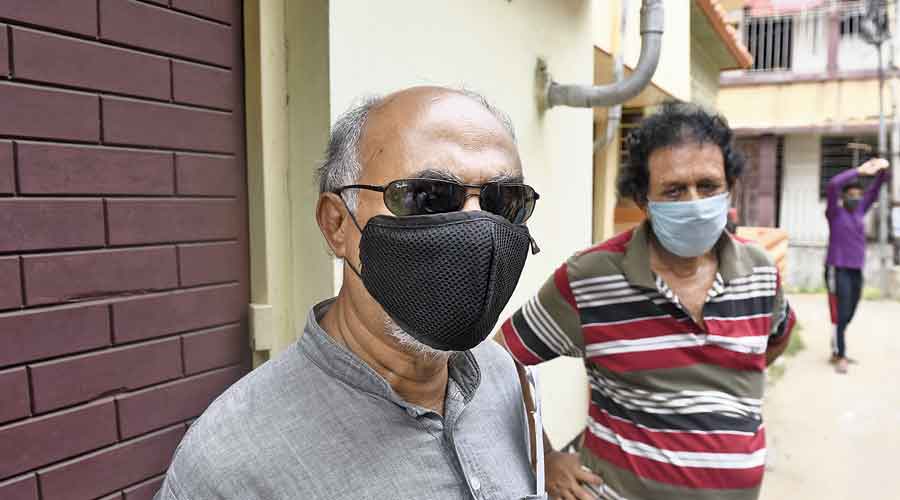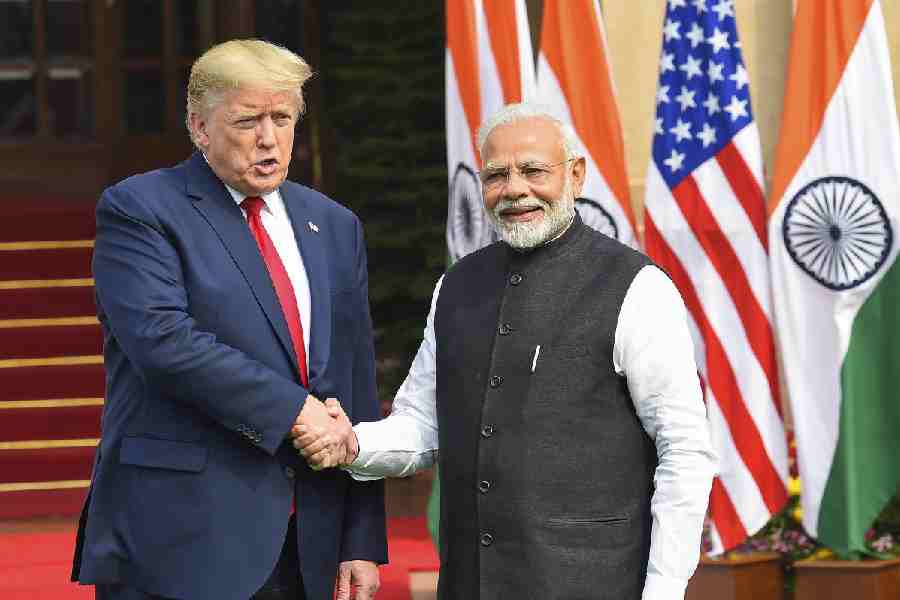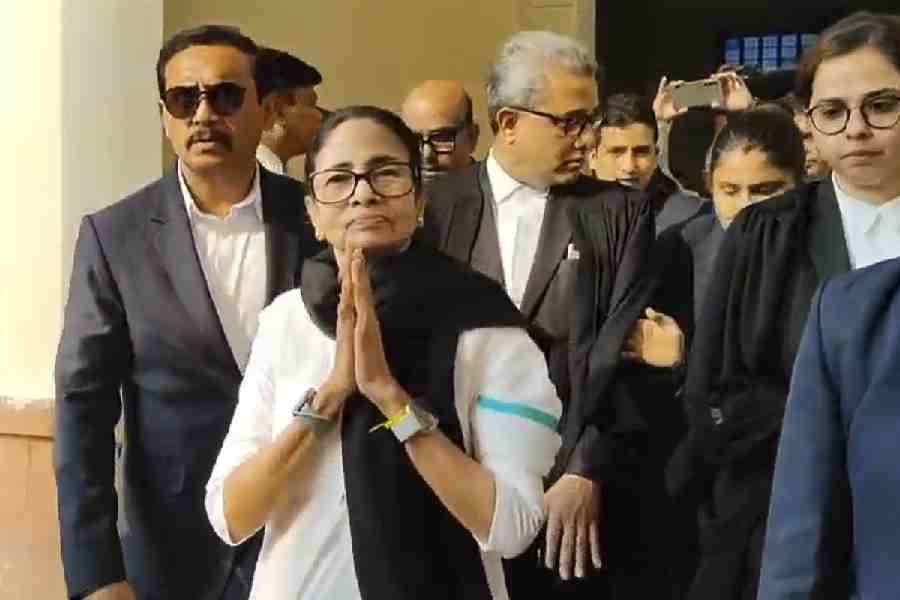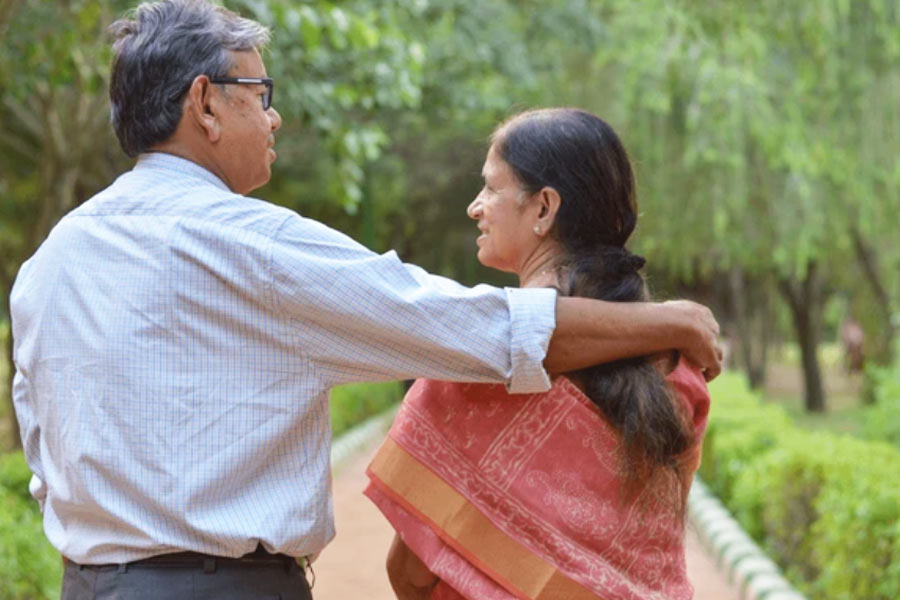Salman Rushdie finds “hope in the determination of India’s women and college students to resist” sectarianism and “dismiss the darkness”.
Since Parliament passed the controversial Citizenship Amendment Act on December 11, 2019, protests led by the young and the women have been held across the country. Calcutta emerged as one of the epicentres of that rallying cry against the new citizenship thrust.
The Telegraph tracks the journey of some of the protesters who had been at the forefront of the movement a year ago and whose struggles have found their way into the electoral battle of Bengal. Many of them are back to doing their bit in resisting an “autocratic and majoritarian regime”. Here’s how
Sabyasachi Mukherjee, student
On March 16, 2021, Sabyasachi turned 23. March 16 was also the second day of a two-day nationwide strike called by an umbrella body of nine bank unions to condemn the Centre’s proposal to privatise public sector banks.
The birthday boy spent the first half of the day in front of a government bank in the Dalhousie area, where students, rights activists and self-help group members joined bank officers to protest against a common adversary — the “anti-people” central government.
At the demonstration, Sabyasachi represented “No Vote to BJP”, a campaign that aims to “warn” people about the “dangers” posed by the Right-wing ecosystem.
In the afternoon, Sabyasachi joined hundreds of other people in front of the Indian Coffee House at College Street. A street-corner meeting was held in protest against the alleged defacing of “No Vote to BJP” posters by party supporters at the Coffee House the day before.
Later in the evening, Sabyasachi’s friends arranged for a cake, which he cut at the Coffee House.
“Resisting fascist forces is much more important than celebrating my birthday. The BJP sees Bengal as its final frontier. But we will do everything that we can to resist them from conquering Bengal,” Sabyasachi told this newspaper.
Sabyasachi, a chemistry graduate from Dinabandhu Andrews College, is gearing up for a three-year LLB course. He is inspired by Sudha Bharadwaj, a lawyer and rights activist who has been in custody since her arrest in the Bhima Koregaon case in 2018.
“I want to build a lawyers’ collective that will stand against oppressors. The way activists are being hounded in our country does not befit a democracy,” he said.
Sabyasachi grew up in Burdwan and studied at the Burdwan Municipality High School. “My classmates came from different religious backgrounds. We grew up together. But post-2014 (when the Narendra Modi government came to power), many of them have been behaving strangely. They keep sharing communal posts on social media,” said Sabyasachi.
He was “driven out” of a WhatsApp group of friends because of his criticism of the Modi government in the wake of demonetisation.
“There comes a time when you can no longer be neutral. You have to pick a side. I have picked mine,” he said.
Raja Majumder, primary school teacher
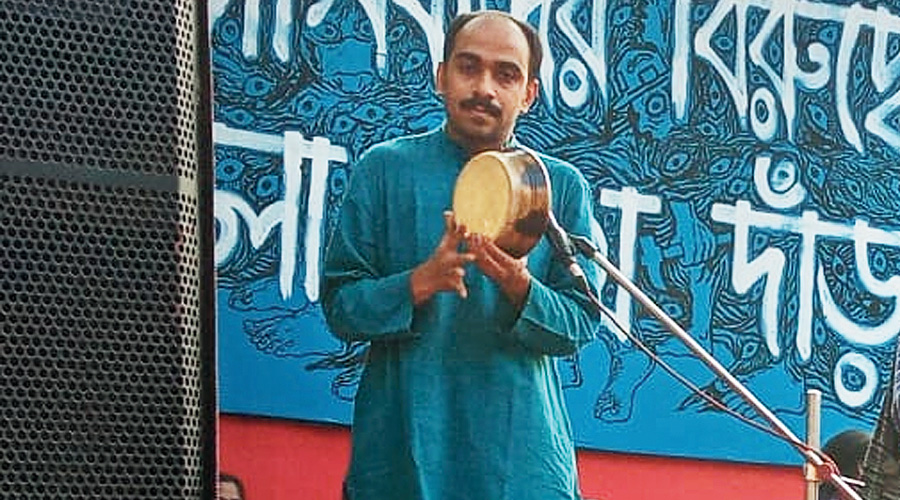
Raja Majumder performs at a protest in Esplanade in February. Telegraph picture
Majumder is part of Janaganamana, an organisation formed by a group of theatre workers in 2019 to help marginalised people. Members of the troupe had visited villages in Malda and Murshidabad flooded by water released from the Farakka barrage.
The villages are flooded almost every year. The controversy around the CAA triggered a new fear. Most of the families the group interacted with said their documents had been swept away, along with other belongings.
“They never thought that not preserving, or not having, some document could make them termites and infiltrators in their own country. That was the time we decided to protest against the CAA-NRC-NPR in our own way — through songs and skits,” said Majumder, 36, a resident of New Barrackpore.
A series of songs by the group — most of them tweaks of popular Bengali numbers — had become a hit in the rallies against the citizenship thrust last year.
“Batashe bohichhe bish, bukete lagilo chot, raja je kohilo heshe NRC eshe gechhe (The air is filled with poison, the heart wounded. The king says smilingly that NRC is here),” said one song.
The troupe members spent the lockdown months preparing a new play called Idurkol (rat trap).
“The play has a message. If your neighbour is in trouble but you are not bothered because you think it is not your problem, think again. Tomorrow, you might be in the same trouble and there will be no one to help you,” said Majumder.
On March 27, the troupe members were allegedly attacked by BJP supporters while staging the play at Basanti in South 24 Parganas.
“I think the CAA-NRC-NPR is a ploy to turn citizens into cheap labourers. Protesting against discrimination is not unusual, sitting idle is,” said Majumder.
Sarmistha Roy, dental surgeon
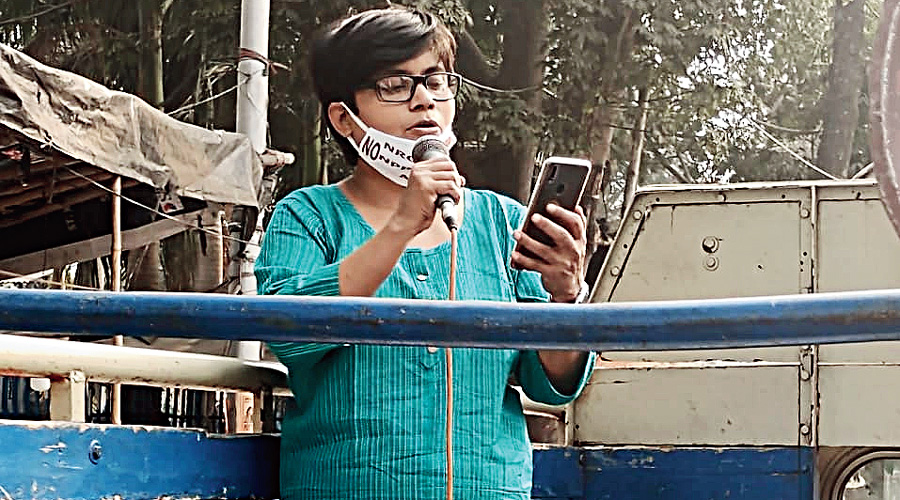
Sarmistha Roy reads a poem at a rally in central Calcutta on December 11 against the CAA-NRC. Telegraph picture
Roy is one of the founders of the No NRC movement, a joint platform of 21 organisations that had been campaigning vigorously against the citizenship thrust.
From August 2020, Roy and her colleagues have been touring districts to make people aware of the “discriminatory nature” of the new citizenship matrix.
“We have been organising workshops, many of them focused on women,” said Roy, who lives and runs a clinic at Tagore Park near the Ruby intersection.
In January, Roy visited Thakurnagar in North 24-Parganas, a Matua bastion where a section of the residents is said to be in favour of the CAA.
“Why do you want citizenship when you are already citizens? You have voter cards, ration cards. The moment you seek citizenship, you admit you are not one,” Roy, 48, told the audience.
At a tribal village in Bankura, Roy warned residents, most of who do not have documents, that “big corporates have been eying your land, which is rich in minerals”. She told them that they were the original inhabitants of the country, having resided on this land for centuries.
While campaigning against the CAA-NRC-NPR combine, Roy realised how fissures were created in everyday lives by communal forces.
In a slum area in Tangra, she had come across a middle-aged woman who had been deserted by her husband. The woman worked as an ayah to make ends meet.
The contractor who gave her work is an active member of a political party. He is said to have promised the woman a decent living space in return for her support for his party. “Where would the space come from?” the woman asked the contractor. He said the “Bangladeshis will be driven out very soon and their homes would be free for local people”.
Nousheen Baba Khan, college teacher
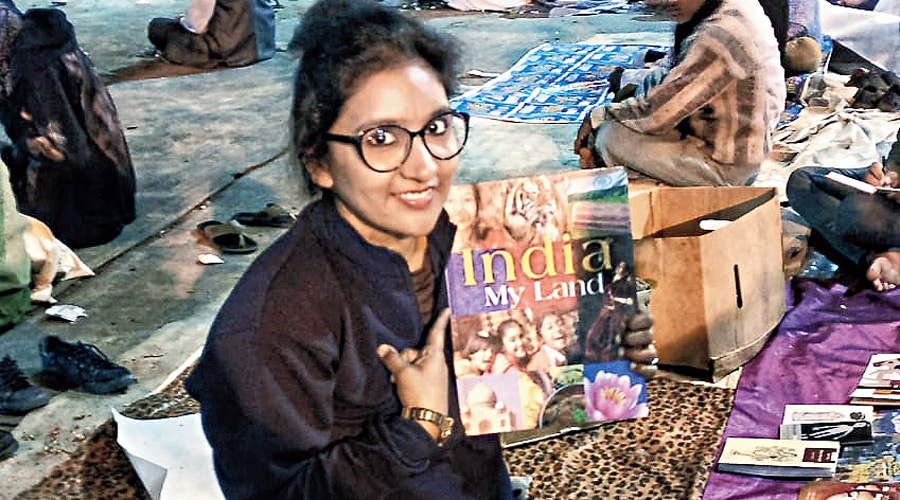
Nousheen Baba Khan at Park Circus Maidan, which had become a “mini Shaheen Bagh”. Telegraph picture
Nousheen, who teaches political science at a city college, was among a handful of women who started the demonstration against the citizenship matrix at the Park Circus Maidan on January 7.
By the time the pandemic forced the organisers to call off the siege on March 23, the protests, led by women, had become a mini Shaheen Bagh, inspiring similar demonstrations at several parts of Calcutta.
Confined, Nousheen started a virtual campaign called “I resist from home”. She engaged in virtual conversations with many people — from Bengal to Kashmir and Uttar Pradesh — to call out the “majoritarian and autocratic nature” of the BJP regime.
“The passage of the CAA was the turning point in my life. It marked a paradigm shift in the politics of the country. At the same time, I was also overwhelmed to see women lead a mass movement. It was a moment of liberation for many Muslim women. The protests needed to continue, even if not in the physical form,” Nousheen told this newspaper.
During the sessions, Nousheen showed her home, decked up with anti-CAA posters, and encouraged others to do the same.
A Kashmir-based activist spoke of “a perpetual lockdown in the Valley because of the Internet siege and stifling of the slightest hint of dissent”.
From January 3 this year, Nousheen started another sit-in protest against the farm laws along with representatives of the Sikh community near the intersection of Chakraberia Road and Sarat Bose Road. The sit-in lasted for over two weeks.
“The BJP regime gives one reason after another for people to rise in protest. The CAA, the labour and farm laws, the crackdown on students — all of these are different manifestations of the government’s fascist nature,” she said.


